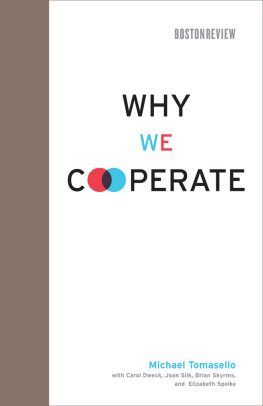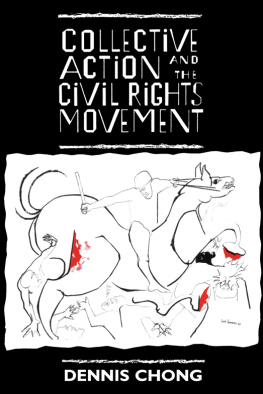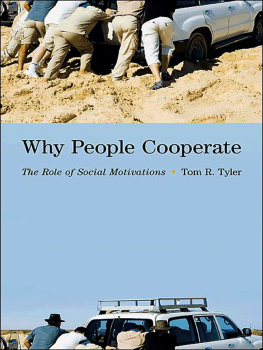How Humans
Cooperate
How Humans
Cooperate
Confronting the Challenges of Collective Action
Richard E. Blanton with Lane F. Fargher
University Press of Colorado
Boulder
2016 by University Press of Colorado
Published by University Press of Colorado
5589 Arapahoe Avenue, Suite 206C
Boulder, Colorado 80303
All rights reserved
Printed in the United States of America

The University Press of Colorado is a proud member of The Association of American University Presses.
The University Press of Colorado is a cooperative publishing enterprise supported, in part, by Adams State University, Colorado State University, Fort Lewis College, Metropolitan State University of Denver, Regis University, University of Colorado, University of Northern Colorado, Utah State University, and Western State Colorado University.
This paper meets the requirements of the ANSI/NISO Z39.48-1992 (Permanence of Paper).
ISBN: 978-1-60732-513-0 (cloth)
ISBN: 978-1-60732-616-8 (pbk)
ISBN: 978-1-60732-514-7 (ebook)
If the tables in this publication are not displaying properly in your ereader, please contact the publisher to request PDFs of the tables.
Library of Congress Cataloging-in-Publication Data
Names: Blanton, Richard E., author. | Fargher, Lane, author.
Title: How humans cooperate : confronting the challenge of collective action / Richard E. Blanton ; with Lane F. Fargher.
Description: Boulder : University Press of Colorado, [2016] | Includes bibliographical references.
Identifiers: LCCN 2016019924| ISBN 9781607325130 (cloth) | ISBN 9781607326168 (pbk) | ISBN 9781607325147 (ebook)
Subjects: LCSH: Cooperativeness. | Cooperation. | Social action.
Classification: LCC HM716 .B53 2016 | DDC 302/.14dc23
LC record available at https://lccn.loc.gov/2016019924
The University Press of Colorado gratefully acknowledges the generous support of Purdue University toward the publication of this book.
Acknowledgments
We gratefully acknowledge the support for this book and critical commentary on an early draft provided by our colleague Stephen Kowalewski. Richs wife, Cindy Bedell, has devoted untold hours to reading multiple drafts, arranging permission for image reproduction, and bibliography checking. We also benefitted from comments by Michael Smith and Audrey Ricke, from three external reviewers for the University Press of Colorado, and from audiences who responded to presentations at Arizona State University, at the Human Relations Area Files, and at meetings of the Society for Cross-Cultural Research and the Society for American Archaeology. The ideas presented here reflect the discussions we have enjoyed over many years with colleagues, especially Gary Feinman, Linda Nicholas, Carol Ember, Melvin Ember, and Verenice Y. Heredia Espinoza. However, all errors or omissions are our sole responsibility. The National Science Foundation of the United States has been our principal source of funding (0204536-BCS and 0809643-BCS), and we also acknowledge the support of the Center for Behavioral and Social Sciences, Purdue University. We gratefully acknowledge the help and support provided by Jessica dArbonne, Darrin Pratt, Laura Furney, Daniel Pratt, and Sonya Manes of the University Press of Colorado.
How Humans
Cooperate
Introduction
How will humans decide to address todays Grand Challenges of resource depletion, climate change, ethnic and religious conflict, and natural and man-made disasters? Grand Challenge problem-solving will demand an unprecedented degree of cooperative effort and effective policies based on well-grounded theories of human nature and of cooperation. Yet, as I searched through the relevant literatures I was disappointed to find inconsistent ideas and research methods, even disagreements about the kinds of questions we need to be asking about humans and about cooperation.
The key barrier to cooperation research is the lack of coordinated efforts between a camp of collective action theorists and a camp of evolutionary psychologists. Differences are evident between the two camps even in something as basic as the questions: What is the nature of cooperation, and what is the goal of cooperation research? Collective action theorists understand cooperation to be a particularly difficult challenge for humans owing, in large part, to the tension that may arise between individual and group interests. Much of their research and theory-building has aimed at learning how humans confront cooperator problems through the construction of institutions (rules and associated forms of social organization and culture) that can foster cooperative behavior.
Unlike the collective action theorists, to evolutionary psychologists cooperation is not a serious problem because, when required, it arises spontaneously as an expression of a prosocial psychology. Thus evolutionary psychologists ignore institution-building, and, while some may consider the importance of culture, ultimately they understand cooperation to result from instincts that have a deep evolutionary history in our species. As a result, they pay little attention to the proximate time frame of collective action theory, which addresses how humans solve cooperator problems in particular social and cultural settings. To evolutionary psychologists, the key research question pertains to the ultimate sources of cooperation, namely, how did humans evolve into a groupish species over hundreds of thousands of years of bioevolutionary history?
In this and later chapters of this book I tilt strongly toward collective action theory, but always from a critical perspective toward both collective action and evolutionary psychology. I find collective action theory superior to evolutionary psychology for a number of reasons, chiefly because its theoretical proposals can be evaluated in the light of data gathered from real human experience, a way of thinking and working that is in line with the expectations of scientific epistemology. I find this empirical dimension admirable. At the same time, I fault the collective action literature for its tendency to emphasize Western historical experience. I also fault its lack of ability to link cooperation to the psychological foundations of human thought and social actionthe human nature question. Evolutionary psychologists do bring psychological factors into the conversation about cooperation. Yet, I find their highly formal methodologies, which depend heavily on experimental game research and computer simulations, unable to match the complexity of real human psychology or of social experience that we find outside the sterile confines of the lab or the computer screen.
The Limitations of Prevailing Cooperation Theories and a Call for Revision
Some researchers have attempted to overcome the divide between empirical and formal (by which I mean experimental game and computer modeling) approaches to cooperation research by presenting both side by side. However, this strategy has not been successful, in my view, even in the writing of some of the bright lights of cooperation studies such as Russell Hardin, Dennis Chong, and Elinor Ostrom (who won the Nobel prize in economics for her work on the collective management of resources). The difficulty I see is an uneasy tension between an empirical dimension, consisting of narrative accounts drawn from particular ethnographic or historical examples, and a formal dimension, the latter based on mathematical modeling and experimental games. The problem is that narrative and formal modes of presentation are highly dissimilar forms of knowledge that are not well integrated.


 The University Press of Colorado is a proud member of The Association of American University Presses.
The University Press of Colorado is a proud member of The Association of American University Presses.







